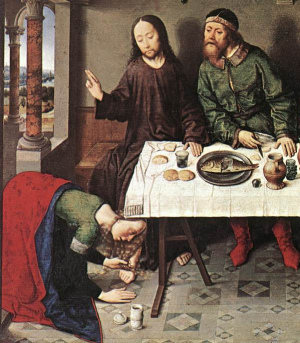Background
A little background will provide a helpful context for the use of David's paradox involving his Lord and son that was directly squarely at those who wanted Jesus dead.
Jewish resistance to Jesus and his ministry began with his first cleansing of the temple in the spring of 27 A.D. (John 2:18). As his ministry continued, Jewish religious leaders (Pharisees, Sadducees, Scribes, etc.) increasingly rejected his teachings and actions. By the middle of 28 A.D., they were not only looking for things with which to accuse him, but also actively conspiring to destroy him (Mark 3:1 - 6).
As time went on, Jewish tactics changed to actively trying to entrap or tempt him either to say or do something with which they could accuse him (see John 8:1 - 6).

The Last Assaults
Jewish religious leaders, on Sunday April 2 in 30 A.D., decided to launch what would become their last and greatest effort to entrap Jesus. It would also be the day when Jesus' response to their assaults would be to pose the paradox of David's Lord and son.
The day begins with the chief priests and elders demanding where and by whom the Lord received the authority to do what he did (Matthew 21:23). The Pharisees then tempt him regarding whether or not taxes should be paid to the Romans (Matthew 22:15 - 22). The Sadducees then try to trip up the Lord with the silly question about who, in the resurrection (which they did not believe in!), would be married to a woman wed seven times (Matthew 22:23 - 33).
Jesus, late in the afternoon, then decides to finally quell the vain attempts by religious leaders to entrap him. His simple questions involving the conundrum of the Lord and son of David takes them totally by surprise!
The Paradox
While the Pharisees were assembled together, Jesus questioned them, saying, "What do you think concerning the Christ? Whose Son is He?" They said to Him, "The Son of David." (Matthew 22:41 - 42).
Note that Jesus first asked the Pharisees regarding whose son was the Christ without directly referencing himself. Their answer, that the Messiah was a human descendant of David (Isaiah 9:7, 11:1, Psalm 89:3 - 4), was known by most Jews (Matthew 9:27, 12:23, 15:22, etc.). Jesus then presents his antagonists with a paradox involving David's labeling of the Christ as Lord coupled with their answer.
He said to them, "How then does David in spirit call Him Lord, saying, 'The Lord said to my Lord, "Sit at My right hand, until I make Your enemies a footstool for Your feet"'?
"Therefore, if David calls Him Lord, how is He his Son?" (Matthew 22:43 - 45).
First note that Jesus, in order to highlight the rock-solid truth of the argument he will make, states that David was "in spirit" or divinely inspired when he wrote it. He then quotes Psalm 110:1 which the Pharisees knew well.
The question so baffled the self-righteous leaders, who took great pride in their perceived understanding of Scripture, that they were speechless! They decide to permanently stop their efforts to entrap Christ in order to accuse him.
And no one was able to answer Him a word, neither dared anyone from that day to question Him any more (Matthew 22:46).
Why Couldn't They Answer?
The Jews inability to figure out, let alone accept, the solution to Jesus' paradox of David's Lord and Son is understandable given their belief system.
"A strict monotheism that asserts God is only one Person is Judaism's leading, defining doctrine. Since rabbinical Judaism, like Islam, has no room for the plurality in the Godhead, it has to deny the Deity of Christ, of God turned man." (A Zeal for God, Section 10 entitled "Was Jesus God?").
"The complexities of this theological discussion were too much for the Pharisees who were not ready to acknowledge the deity of this Son of David." (Bible Knowledge Commentary).
The Clue
What is the clue that helps answer the paradox regarding how David's Lord is also his Son? The clue is found within the quote Jesus used!
David's use of the phrase "The Lord said to my Lord" indicates that there are TWO divine Beings he is referencing. The first "Lord" is God the Father and the second is the Christ (Jesus) who, after his resurrection, sat at the right hand of power.
After speaking to them, the Lord was indeed then taken up into heaven, and He sat down at the right hand of God (Mark 16:19).
But to which of the angels said he (the Father) at any time, Sit on my right hand, until I make thine enemies thy footstool? (Hebrews 1:13, KJV, see also 1:1 - 3, 8:1, 10:12, 12:2, Romans 8:34, Ephesians 1:20, Colossians 3:1).
Conclusion
The question posed regarding the dual relationship of the Lord as both David's God and son has a Biblical answer. Jesus, as a member of the Godhead, was the Being who interacted with all the Old Testament patriarchs. He is "my Lord" referenced in Matthew 22:44 which quotes Psalm 110:1. He was also the member of the Godhead whose chose to be miraculously born as a physical descendant of David in order to save humans from their sins.